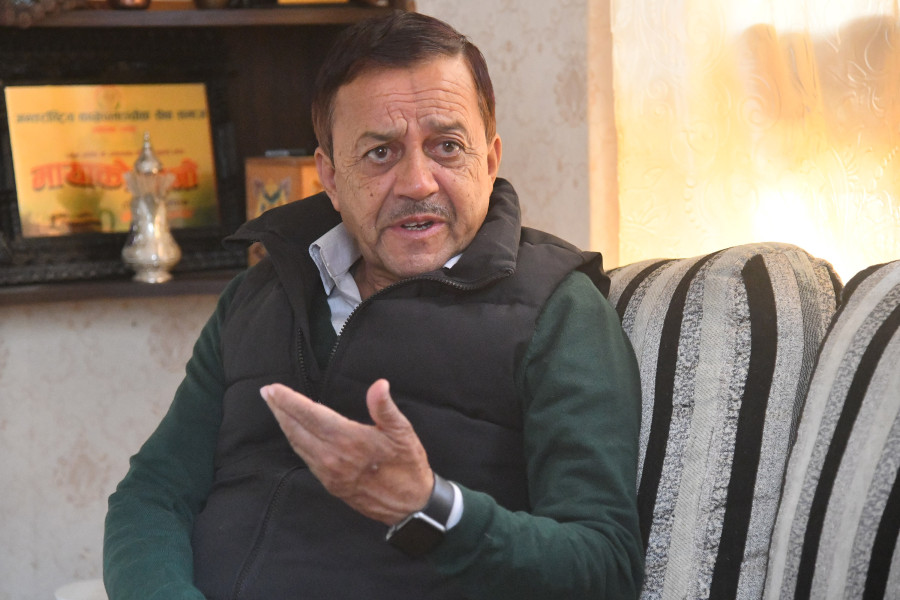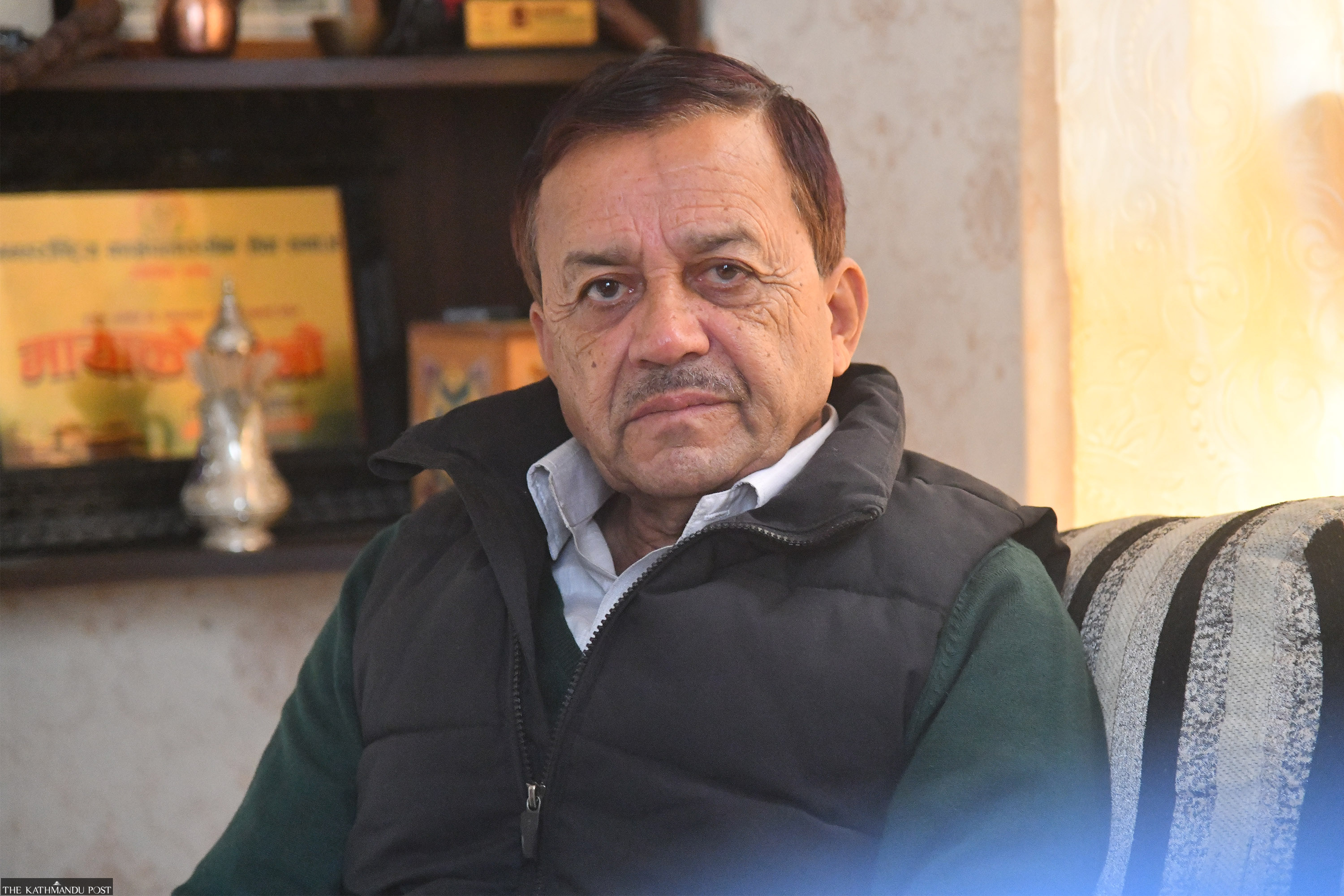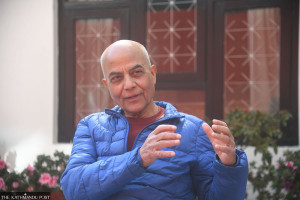Interviews
You can’t blame bureaucrats for your failure to lead the country
Besides undertaking regular development works, politics should also create hope in people. But frustration is palpable everywhere.
Thira Lal Bhusal
Former chair of the Public Service Commission Umesh Mainali, who also served as home secretary, is considered a bold bureaucrat with high integrity. Thira Lal Bhusal of the Post sat with him to discuss the Pushpa Kamal Dahal government’s year in office.
The government has completed a year. How do you rate its performance?
The one-year performance should be analysed from two perspectives. One based on facts and figures and the other based on public perception. While analysing based on facts, some indicators aren’t too bad but some key economic indicators aren’t good either. Capital expenditure is poor. The country’s revenue is hardly sufficient to manage recurrent expenditure. Of late, the situation of revenue collection is improving, albeit slowly. External indicators such as flow of remittance and foreign currency reserves are looking good.
Governance indicators aren’t good. In the corruption perception index (CPI) of 2023, Nepal’s score is 34. Other Saarc countries like the Maldives, India, Bhutan and Sri Lanka have done better. In the region, only Bangladesh, Pakistan and Afghanistan are behind us. Worse, the public perception of the government is not good. We hear people express anger and frustration in tea stalls, social media and other platforms. Besides doing tangible development works, politics should also create hope in people. But frustration is palpable everywhere.
There are always expectations following major political changes. When common people don’t get dividends of the change, they feel betrayed. Then, it leads to a socio-political situation that is called a silent revolution of frustration. Youths don’t see any point in staying in the country. This is the result of frustration. Those in the government should heed it.
But the prime minister and other top leaders of major parties argue that the country’s situation isn’t bad. They claim certain elements are spreading wrong narratives to discredit the current political system.
It is their political reaction. We can’t rule out efforts from some quarters to undo the political changes as they aren’t happy with the current political system. But the government can’t escape its duty on that ground. It must prove its legitimacy by doing something good for the people. Leaders should have a vision of what type of country they want to build and people should be convinced by that. The prime minister has time and again shown his willingness to do something. But the initiatives should be impactful. The government should work with a clear vision and a long-term mindset. You win public trust over time. But present-day politicians prefer distributing goodies, expecting immediate admiration.
But the prime minister claims to have taken historic steps with lasting impact in terms of governance and development. Do you agree?
He has undertaken some reform measures. As I said earlier, some economic indicators such as foreign currency reserves are positive. But he can’t boast of revolutionary achievement just on that ground. Neither the facts and figures nor the public perception substantiate that he has done something big. In the meantime, we should accept that this government has initiated at least some investigation in major scams such as in Lalita Niwas land grab, fake Bhutanese refugee scam and the gold smuggling cases.
There are some questions as to whether all suspects are being treated equally. But taking investigations to this level is something important in itself. The government should get credit for this. Second, the prime minister admitted that too much politicisation in academic institutions including in Tribhuvan University have destroyed them. He has pledged to make appointments based on merit. Now let’s see if he walks the talk.

Will those involved in the fake Bhutanese refugee scam be punished? Is the investigation and prosecution on the right track?
We can’t comment much on the Bhutanese refugee scam as the issue has reached the court and it is sub judice. Some questions have been raised publicly. People are asking why some politicians were spared.
Ruling party leaders have presented bringing politicians under investigation as a major success while others have described it as yet another move to punish junior officials while protecting powerful ones.
The investigations initiated by the government on some major scams are laudable, except for some shortcomings.
What about public criticism about sparing top politicians in the Lalita Niwas land grab scam?
Yes, we see that in this case. Officials who prepare notes have been punished. Even non-gazetted officials have been punished. But the decision-makers have been spared. Those who chaired Cabinet meetings while taking the decisions were seen only as witnesses. That isn’t fair. I think there have been some mistakes.
In this case, civil servants argued that they only implemented the decisions made by politicians while the then ministers and prime ministers argued that they took the decisions based on the documents prepared by the civil servants. Who is to blame?
Those who took the decisions can’t say, “I only signed on the documents the civil servants prepared and forwarded to me”. There is a theory called the ‘principle of directing minds’. Those who can have authority to direct other people should be held accountable. Politicians often blame bureaucrats to escape their responsibility. We see the same tendency in our leaders. They take decisions and blame civil servants. That is irresponsible.
The matter of public accountability is serious. Police fire at protesters on the street but ministers lose their jobs. Ministers don’t open fire but they take responsibility. Some years ago, a youth lost his life in police firing in Butwal. That became a big issue. I, as a joint secretary, led the investigation in the matter. Three ministers at the time had to resign. Those in responsible positions can’t just pass the buck. Prime Minister Pushpa Kamal Dahal has shown willingness to take initiatives for good governance. But if he blames the bureaucrats for his failure, he doesn’t deserve to be the executive head.
On Saturday, the government took action against some police personnel and bureaucrats in the Balkumari incident when two youths lost their lives. As a former home secretary, how do you see the decision?
Sometimes, authorities take such decisions to pacify unruly crowds and quell public anger. It is said that a mob has many heads but no brains. Therefore, the authorities should be very cautious. Sometimes, the state creates scapegoats to pacify protesters but if the investigation concludes that they didn’t abuse power, they will not face action.
Many argue the practice of forwarding fishy issues to the Cabinet to make decisions and describe them as policy decisions has promoted corruption. There is a demand that Cabinet decisions should be investigated by the Commission for Investigation of Abuse of Authority. What is your view?
Decision-making and policy-making are different things. All decisions in Cabinet meetings aren’t policy decisions. Only those that set guidelines for future decisions are policy decisions. Making a decision for one particular purpose is decision-making, not policy-making. If a Cabinet meeting awards a contract to a company, how can it be a policy decision? If the Cabinet determines the criteria to award contracts, then that is a policy decision. The CIAA should be bold enough and investigate wrong Cabinet decisions, saying that they aren’t policy decisions. Then they will stop forwarding unrelated issues to the Cabinet. Decisions made with regard to Lalita Niwas land issue aren’t policy decisions.
Parties disputed whether the gold smuggling issue should be investigated by state agencies or an independent commission. Now a commission has been formed. What is the right way?
It should be investigated by existing state agencies. There are already multiple bodies. Creating more bodies only sows confusion.
Opposition leaders argued that an independent high-powered commission is needed as police officials and civil servants can’t grill senior politicians and ministers. Is that so?
Why doubt the CIAA and other agencies that have constitutional rights to investigate such matters? Haven’t former home ministers and ministers been sent to jail based on police investigation? The case of former home minister Balkrishna Khand is the latest one. These institutions have well-trained and efficient officials. If they are allowed to work independently, they can do their job effectively. We should trust the state agencies.
The nexus between politicians, bureaucrats and middlemen has been exposed in various instances including in the Bhutanese refugee, Lalita Niwas and gold smuggling cases. Are government initiatives enough to break such a strong nexus?
Yes, there is a big collusion among them. Big scams aren’t possible without a nexus. Interestingly, the same middlemen wield power even as governments come and go. They get access to kitchen Cabinets of successive prime ministers and they can even set the agenda. Government initiatives aren’t sufficient to break such a nexus.
New political forces have made good governance their major agenda. How is their performance?
They are yet to be sufficiently tested. But they didn’t do well in the brief test. For instance, Rabi Lamichhane got a chance to lead the home ministry briefly. The ministry at the time decided to award a flawed contract to prepare national ID cards. The next minister corrected it. How can he [Lamichhane] escape responsibility by saying that he only signed on the document prepared by bureaucrats? Doesn’t such a clever man understand its consequences?




 9.12°C Kathmandu
9.12°C Kathmandu



.jpg&w=200&height=120)








